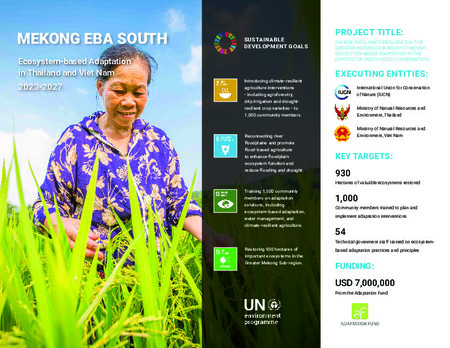Mekong Eba South: Ecosystem-based Adaptation in Thailand and Viet Nam 2023-2027

Date
2024-05Author
United Nations Environment Programme
Citation Tool
Bibliographic Managers
RT Generic T1 Mekong Eba South: Ecosystem-based Adaptation in Thailand and Viet Nam 2023-2027 A1 United Nations Environment Programme YR 2024-05 LK https://wedocs.unep.org/20.500.11822/45490 PB AB TY - GEN T1 - Mekong Eba South: Ecosystem-based Adaptation in Thailand and Viet Nam 2023-2027 AU - United Nations Environment Programme Y1 - 2024-05 UR - https://wedocs.unep.org/20.500.11822/45490 PB - AB - @misc{20.500.11822_45490 author = {United Nations Environment Programme}, title = {Mekong Eba South: Ecosystem-based Adaptation in Thailand and Viet Nam 2023-2027}, year = {2024-05}, abstract = {}, url = {https://wedocs.unep.org/20.500.11822/45490} } @misc{20.500.11822_45490 author = {United Nations Environment Programme}, title = {Mekong Eba South: Ecosystem-based Adaptation in Thailand and Viet Nam 2023-2027}, year = {2024-05}, abstract = {}, url = {https://wedocs.unep.org/20.500.11822/45490} } TY - GEN T1 - Mekong Eba South: Ecosystem-based Adaptation in Thailand and Viet Nam 2023-2027 AU - United Nations Environment Programme UR - https://wedocs.unep.org/20.500.11822/45490 PB - AB -View/Open
Item Statistics
Display item statisticsMetadata
Show full item recordDescription
The Greater Mekong Sub-region (GMS) crosses
over six countries, including Thailand and Viet
Nam, and supports 75 million people living who
rely on its natural resources. Despite the critical importance of the
ecosystems of the GMS, they face multiple
threats that reduce their capacity to provide
goods and services for local communities that
depend on these ecosystems for livelihoods. This project is using Ecosystem-based
Adaptation (EbA) to combat drought and flood
risk across the GMS, including rehabilitating
forests, grasslands, riverbanks, and community
forests. In addition, the project is building climate
resilience by introducing climate-resilient
agriculture, improved water management
practices, a national adaptation strategy,
and training programmes to build adaptation
capacity.
Collections
Document Viewer
To read more, scroll down below.

